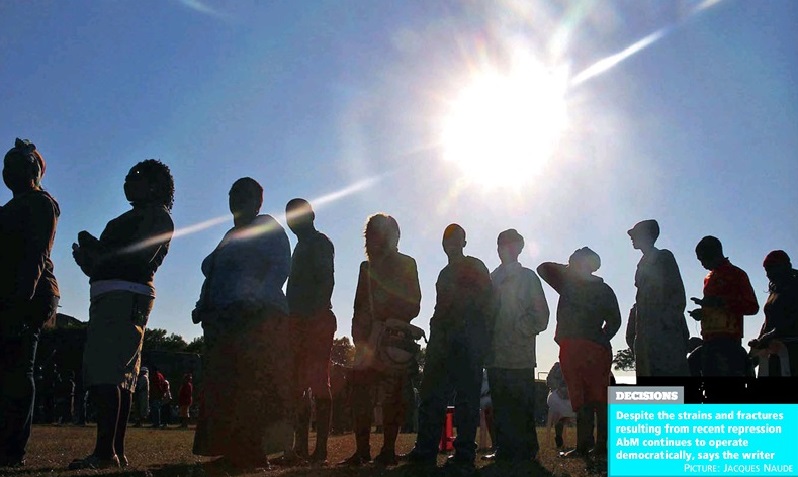
DURBAN, the city where Jacob Zuma has his firmest urban base, is a hard place to do politics.
Threats of violence are common from the top to the bottom of the ruling party's local hierarchy, and violence, including murder, is often used as a mechanism of social control.
In this city, the conflation of the ruling party with the state is also more advanced than in some other cities, with the result that development is brazenly mediated through local party structures.
It is not at all unusual for party membership to be a pre-condition of access to what goods and services the state does provide to the poor. One result is corruption is not just a way to arrange personal accumulation via the state but is also a mode of social control.
Around the country municipalities tend to try to contain the urban poor, and in particular the popular appropriation of land and services in unlawful, violent ways.
But in some cities the law is adhered to if a court demands this. In Durban there has been brazen disregard for court orders. And in this city the brutality with which the local state uses violence as a routine tool of governance is often extraordinary.
Yet of all South African cities it is in Durban that the largest, best organised and most sustained attempt to organise a popular constituency outside of the ANC has been developed. For nine years Abahlali baseMjondolo (AbM) shack dwellers' movement have organised independently of the ANC in Durban's shanty towns. From the beginning the ANC approached the movement as if it was fundamentally illegitimate and over the past nine years has repeatedly said it is a project of a "third force", an attempt by foreign powers to undermine the ANC.
Repression has ebbed and flowed. It has, above all else, been international solidarity, and access to the elite public sphere abroad, which has enabled the movement to shift its engagement with the state off the terrain of violence and intimidation and into negotiation.
Over the past nine years the movement has become effective at stopping evictions, and organising or supporting land occupations, some of which have been undertaken away from the public glare and one of which has become a major point of public contention. This work has made it impossible for the ANC to carry out its programme of mass evictions and forced removals to the urban periphery and so the movement has been quite successful in opposing new forms of spatial segregation.
The movement has also forced through important changes in how the municipality relates to shack dwellers. As a result of the AbM struggle it is now, for instance, committed to providing electricity and ablution blocks to shack settlements. But it has been difficult to effectively challenge the way in which development is mediated through local party structures.
There are more or less constant attempts by parties and NGOs to co-opt individuals. Communities sometimes join the movement as a collective act bringing in their political assumptions and practices which do not always fit well with the movement's politics. Nonetheless, despite the strains and fractures resulting from recent repression AbM leaders continue to be elected and important decisions to be produced out of democratic processes.
One of these processes, which even those deeply unhappy with the outcome agree was democratic, led the movement to offer a tactical vote for the DA in KwaZulu-Natal in the recent election. The movement has made it clear this does not mean it embraces the DAs policies and that it will not join the DA.
Given that the DA runs an exclusionary urban regime in Cape Town which is often predicated on state violence and illegality, and its policies are generally to the right of those of the ANC, it is unsurprising this decision has shocked some. But we should recall one of the reasons why other organisations on the left would never come to a decision like this is they are often not democratic and, in most cases, do not have a large constituency organised via communities.
The decision to offer a tactical vote to the DA, overwhelmingly supported from below and in opposition to the leadership's own thinking, is largely a reaction to repression. People had a sense they simply could not carry on with a situation in which they could be subject to violence, including murder, with impunity.
It is a decision to oppose the ANC directly and punish it for its repression by offering a tactical vote to its largest and most effective rival in the province.
The members of the movement which voted for it to make a tactical vote for the DA did not identify with the DAs policies but generally felt the left alternatives had no real prospects of making any impact at the polls in KZN.
This decision brings to an end a nine-year sequence of struggle which has been resolutely independent from party politics. But it is too early to say what it will mean in the medium or long term. It could essentially leave things as they are, it could encourage the DA, and other political parties, to take the circumstances and struggles of the urban poor more seriously if they want to court this vote and it could result in some sort of enmeshment, organisationally and ideologically, between the DA and AbM.
The last outcome would, of course, be a major setback for attempts to challenge the exclusionary and repressive urban order in our cities, as well as attempts to build popular democratic power outside the ruling party which can be articulated to a broader project for progressive social change.
By Richard Pithouse
Source: Cape Argus
Photograph by Jacques Naude
Dr Richard Pithouse teaches politics at Rhodes University.
